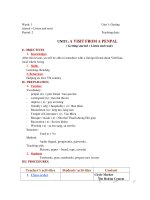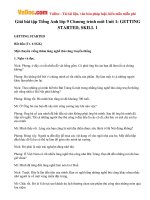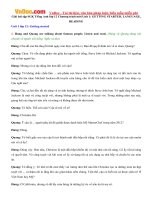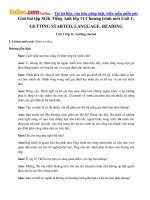- Trang chủ >>
- Lớp 8 >>
- Giáo dục công dân
Unit 1 The generation gap Lesson 1 Getting started
Bạn đang xem bản rút gọn của tài liệu. Xem và tải ngay bản đầy đủ của tài liệu tại đây (254.42 KB, 12 trang )
OBJECTIVES
By the end of this unit, Ss can
use words and phrases related to the generation gap and family rules
identify and pronounce strong and weak forms of words in connected speech
use modals to give opinions and advice: should, ought to
use must and have to to express obligation
read for specific information in an article about the generation gap
talk about parent-child relationship problems and offer advice on how to solve
them
listen for specific information in a conversation between two teenagers about
conflicts with their parents
write a letter about family rules to a teenager staying at a homestay family
understand the concept of extended and nuclear families, and the reasons for the
return of extended families in the UK and the USA
GETTING
STARTED
Our families
Lead-in: Inform the class of the lesson objectives: getting to know the topic, vocabulary
about the generation gap and family rules, two grammar points: should and ought to for
giving opinions and advice, and must and have to for expressing obligation.
*
To start the lesson, write the title of the unit THE GENERATION GAP on the board and
ask Ss to list examples showing the gap between different generations. Tell Ss that
these differences can be in the choice of music, clothing, values, lifestyles, ways of
shopping (directly from shopping centres or online), or communication.
¢
AskSs questions about the picture: This is a photo of a big family. Who are the people in the
photo? Is this type of family popular in your community? Elicit answers from Ss.
Unit! The Generation Gap
6T
Tell Ss that they are going to listen to a
conversation between two friends, Sam and Ann.
Let Ss guess what Sam and Ann are talking about.
Play the recording. Ss listen to the conversation
and read along.
4
®
°
Tell Ss not to worry about new language items
as they will have a chance to come back to them
later on.
Ask Ss to read the statements and decide if
they are true (T) or false (F) and refer to the
conversation to find clues for their answers.
Check Ss’ answers.
Key
1F
2F
4F
5.7
meanings of the compound nouns.
Tell Ss to compare their answers in pairs
/ groups.
Then check answers as a class.
hairstyles, housework, footsteps
5 This activity focuses on should, ought to, must and
have to.
®
°
3T
other compound nouns.
Allow Ss to use a dictionary to look up the
Key
grandparents, grandma, grandpa, grandmother,
Tell Ss this activity will help them to understand
the conversation through comprehension
questions.
Ask Ss to read the conversation again to find seven
]
Ask Ss to read the conversation again, and find the
verbs expressing duty, obligation, advice, or lack of
obligation.
Have Ss compare their answers in pairs / groups.
Then check answers as a class.
Key
Opinion & advice: should and ought to in positive
and negative forms
3 Tell Ss this activity focuses on compound nouns.
* Duty & obligation: must and have to
Ask them to complete the definitions, using the
highlighted compound nouns in the conversation.
* Lack of obligation: (not) have to, (not) need to
Ask Ss to check answers in pairs.
Check Ss’ answers.
Key
1.A nuclear family
2. Childcare
3. A generation gap
5. A viewpoint
4. Table manners
6. An extended family
6 This activity provides initial speaking practice,
using the ideas from the conversation and Ss’ own
ideas.
*
¢
Ask Ss to work in pairs to ask and answer the
questions.
Have some Ss tell the class about their partners’
type of family and what they like and dislike
about it.
Unit! TheGenerationGap
7T
LANGUAGE
Pronunciation
Vocabulary
This activity focuses on stressed and unstressed
Compound nouns
words in sentences, and enables Ss to discover a
connection between stress and grammar.
Play the recording for Ss to listen and repeat.
Tell Ss that this activity focuses on the compound
nouns in the unit and their spelling.
Ask them to match each single noun (1-9) with
Ask Ss to pay attention to the stressed words with the
stress mark before the stressed syllable.
another (a-i) to make a compound noun.
Tell them to check their answers in pairs, then
Play the recording again for Ss to listen, pausing
after each sentence. Have Ss work in pairs to find
out the parts of speech of the words which are
stressed in these sentences.
check as a class. Give the meanings of these
compound nouns, if necessary.
Draw Ss’attention to the four compounds written
as one word: household, hairstyles, schoolchildren,
footsteps.
Ask Ss to study the Do you know ...? box for more
information about words that normally receive
stress in connected speech.
Notes
A compound noun is a noun that is made up of
two or more words.
Each compound noun acts as a single unit and can
be modified by adjectives and other nouns.
In compound nouns, the stress usually falls on the
first word. This helps us to distinguish between
compound nouns and free word combinations.
Example:
a ‘greenhouse: a place for growing plants
(compound noun)
a ‘green ‘house: a house painted green (free
word combination)
(Review the formation of compound nouns: Tieng
Anh 10 - Unit 5, Language section)
Key
`
2
1-g
5-c
2-h
6-b
3-i
7-a
4-f
8-d
9-e
-
This activity focuses on the use of compound
nouns in appropriate contexts.
Ask Ss to complete the questions with some of the
compound nouns in 1.
Have Ss work individually first. Then ask them to work
in pairs / groups, and compare their answers.
Check Ss’ answers. Have them practise asking and
answering all the questions in pairs.
Key
1. hairstyle / table manners
2. generation gap
4, junk food
3. nuclear family
5. schoolchildren
Unit! TheGenerationGap
8T
2 This activity focuses on words with either strong
forms or weak forms depending on their function
in the sentence.
¢
Explain the activity to Ss, drawing their attention to
the words in bold.
°
Have Ss work individually first, then play the recording
¢
°
and ask them to check their answers in pairs.
Ask Ss to study the Do you know ...? box and learn
how to use should and ought to to give opinions
and advice; and must and have to to express
obligation.
Use the information from Notes to give further
explanations, if necessary.
Check answers as a class, highlighting the different
Notes
and learn the rules for the weak forms.
Ought to is not as common as should and is a little
more formal in questions and negatives.
cases. Then ask Ss to study the Do you know...? box,
Ask pairs of Ss to role-play the questions and
answers in front of the class. Praise Ss who
pronounce the strong and weak forms correctly.
Notes
In a sentence, the following words are
unstressed:
1. Function words: pronouns, the verb be,
auxiliary verbs, articles, conjunctions, and
prepositions
2. this, that, these, and those when followed by
a noun
3. who, whose, when, where, why, what and
how when they introduce a relative clause
Exception:
When auxiliary verbs and modals are not
followed by a verb, they have strong forms.
Key
-
1.A-strong
2. A- weak
B - weak
B - strong
3. A- weak
We use | don’t think we should/ ought to rather
than | think we shouldn't/ oughtn't to.
Example:
! don’t think you should invite your friends to stay
overnight.
In their negative form, mustn't and don't have to
have different meanings. We use mustn't when
an action is forbidden or prohibited.
Example:
You mustn't cheat in the exams.
We use don't have to when the action is not
necessary.
Example:
Students don’t have to go to school on Sundays.
This activity focuses on should and ought to to
give opinions and advice, and must and have to to
B - strong
express obligation.
Ask Ss to use the word in brackets to rewrite each
sentence without changing its meaning.
Have Ss do this exercise individually. Monitor the
activity and help them, if necessary.
Check Ss’ answers by asking individual Ss to take
turns to read aloud the sentences, and then write
them on the board.
Key
1 Tell Ss that this activity focuses on the use of should
/ shouldn't, ought to/ ought not to, must / mustn't,
have to/ don't have
*
to.
Ask Ss to underline the correct words to complete
®
the sentences, and pay attention to the meaning of
the sentences in order to choose the right word.
Have Ss work individually first, then ask them to
¢
Check Ss’ answers.
2. You mustn't use your mobile phone in the
examination room.
3. | don’t have to type my essay.
4. You should tell the truth to your family.
5. Young people must plan their future career
carefully.
compare their answers in pairs.
Key
1.should
2.ought
4.haveto
5.mustrt
3. must
Unit! TheGenerationGap
9T
SKILLS
READING
Where do conflicts come from?
Lead-in: Ask the question ‘Where do you think family conflicts come from?’ to
elicit Ss’ opinions.
®
Have Ss brainstorm different factors leading to family conflicts.
®
Ask individual Ss to share their opinions and encourage different
viewpoints.
1 This activity focuses on Ss’ predictions about the reading text.
¢
Introduce the reading text, and elicit some sources of conflict.
®
Ask Ss to tick the conflicts (a-g) and then compare their choices with their
partner's.
¢
Ask some Ss to share their opinions with the whole class.
*
[
Don't give any comments at this stage. Help Ss with any unfamiliar words
in the list (a-g).
Key Students’ answers
)
2 This activity focuses on skimming (See Introduction).
¢
°
[
Ask Ss to skim the text and compare their predictions in 1.
Check Ss’ answers, and ask them to give the clues from the reading text
which helped them to work out the answers.
Key
b
c
d
e
f
]
Unit! TheGenerationGap
10T
3 This activity focuses on working out the meaning
of new words based on the context.
° Ask Ss to match the highlighted words in the text
5 This activity enables Ss to think about their own
experiences in relation to the issues in the reading
text and discuss them.
with the definitions given.
®
Tell Ss to go back to the reading text to locate
the highlighted words and study the context
surrounding the words to work out their meaning.
Then match them with the definitions.
®
Have Ss work individually, then check their answers in
pairs or groups.
*
Check the answers again as a class.
*
Have Ss work in pairs and take turns to share their
problems, and give opinions or advice.
*
Ask some pairs to report the results of their
discussion.
Key
1. afford
4, norms
2. impose
5. conflicts
3. brand name
4 This activity focuses on reading for specific
information.
*
Ask Ss to read the questions first to work out the
type of information they will look for in the text.
®
Have Ss work in pairs
/ small groups to compare
their answers.
*
Check Ss’ answers as a class.
SPEAKING
What are the conflicts about?
Lead-in: Ask Ss to discuss the situations in the pictures
and say what conflicts each one may lead to.
Notes
Example: Parents may not like when their teenage
Reading strategies:
Always look at the text first before you look at the
children go out with their friends late at night.
1 This activity focuses on conflicts between
teenagers and their parents.
questions to have a general idea what it’s about.
Read the questions and underline key words
from the questions.
*
Ask Ss to read about three situations facing
¢
Walk around and help Ss, if necessary.
*
Have Ss compare their answers. Check Ss’ answers.
°
Ask Ss to further discuss if they have ever
experienced these situations, and how they felt.
They may give advice or express their opinions.
[
Key
Scan the text for key words and synonyms of key
words from the questions.
Key
1. Because they strongly believe they know what
is best for their children.
2. They want to be more independent, create their
own opinions, and make their own decisions.
/
¬
Read the sentences around the key words to get
the information needed.
teenagers, and then match them with the
problems a, b, or c in the box.
1.b
2.¢
3.a
]
3. They are worried because these clothes may
break rules and norms of society, or distract
them from schoolwork.
4, They want their children to spend their time in
a more useful way.
5. No. Some of them try to impose their choices
of university or career on their children.
Unit! TheGenerationGap
11T
2
This activity focuses on the ideas and useful language that Ss can use in 3
when they talk about their problems with parents.
®
Ask Ss to read the list of things teenagers and their parents complain
about.
®
Have them tick the complaints that they hear in their families.
¢
Encourage Ss to add some more complaints if they can.
*
Help Ss with any new language they may need to express their ideas.
[
Key Students’ answers
|
3 This activity focuses on speaking about conflicts between teenagers and
parents, and giving opinions and advice to solve the problems.
®
Ask Ss to work in pairs and take turns to tell their partner what they or their
siblings and their parents often complain about, and then practise giving advice
on how to solve the problem.
®
Encourage Ss to use the structures listed in Helpful expressions.
¢
Walk around and help Ss, if necessary.
®
Ask some pairs to role-play their conversation, and give feedback on their
performance.
Unit! TheGenerationGap
12T
4 This activity focuses on listening for specific
LISTENING
information and inference (Question 3).
Tell Ss that they are going to listen to the conversation
How are we different?
again, and doa multiple choice exercise.
Lead-in: Ask Ss to look at the photos of the two
teenagers, and think about what problems they
Remind Ss to try to ignore any distractors that
may appear in the recording, and listen for specific
information.
Ask Ss to check their answers with a partner.
Check answers as a class.
may have.
Tell them to focus on hobbies (Photo a) and
fashion (Photo b) and elicit Ss’ opinions.
Have Ss talk about what the parents of these
teenagers might complain about.
[
@)
Tell Ss that they are going to listen to two
teenagers, Tom and Linda, discussing their conflicts
with their parents. Ask Ss to circle what they think
the speakers will mention in their conversation.
Key Students’ answers
)
This activity focuses on new vocabulary items.
Tell Ss to match the words with their definitions.
These words will be heard in the conversation.
Have Ss compare their answers. Check their
answers.
4.C
5.B |
4.¢
}
This activity focuses on listening for specific
information.
Tell Ss that they are going to listen to the
conversation between Tom and Linda and decide
whether the statements are true (T) or false (F).
Have Ss make guesses first. Encourage all possible
answers and explanations. Write their guesses
on the board so they can see if the guesses are
correct later.
:
:
Linda:
They don’t like my sparkling clothes or high heels. They want me :
to wear more casual stuff such as jeans and T-shirts.
:
Well, it depends on where you're going. If you're going to a
party, you could dress up, but | don’t think you should wear
flashy clothes every day.
But | really want to look more elegant and fashionable.
Well, have you thought about the costs? Perhaps your parents=
can't afford to buy expensive clothes.
:
Maybe you're right. What about you? Do you get into conflict:
with your parents?
F
Not really. But they forbid me to play computer games.
Sounds bad. What's wrong with computer games?
:
They think all computer games are useless. They want meto :
use my computer for more useful stuff.
:
But there are some positive benefits of playing computer games. :
Tom:
Yes, there are. | can read faster because | can concentrate
Tom:
Tom:
Linda:
Tom:
skinny (adj), top (n), stare at (v), balance (v)
3.b
3.B
Audio script
Linda:
understand the conversation, pre-teach additional
words.
2.a
2.A
Tom: You look upset, Linda. What's the matter?
Linda: Nothing serious. Just my parents keep complaining about my clothes.
Tom: Oh, why don’t they like them?
Linda: They think my trousers are too skinny and my tops too tight.
Linda:
Tom:
If you think your class might not be able to
1.d
1.C
ELL,
Tell Ss that this activity focuses on listening for
general ideas.
Key
Key
:
more. Playing computer games after school also helps me to :
relax after a hard day.
Linda: But your parents may worry about your eyesight if you look a
the computer screen for a long time.
: Yes, they probably worry about it, and want me to have a
healthier lifestyle with more outdoor activities.
: That's right. | think you need to tell your parents that you agree
with them, and explain the benefits of computer games.
That's a good idea. | hope my parents understand that. Thank you.
Linda: No problem. Thanks for your advice, too.
Play the recording for Ss to listen.
Check Ss’ answers. If many students have the same
incorrect answers, play the recording again, pausing
at the places where Ss might have got the incorrect
answers and discuss the problems.
Key
1F
2F
3T
4T
5T)
5 This activity focuses on some of the ideas from the
listening conversation.
Have Ss work in pairs to ask and answer the questions.
Encourage them to share their experiences with
their partner who is expected to give advice or
express opinions.
[
Key Students’ answers
Unit! TheGenerationGap
)
13T
WRITING
Family rules
Lead-in: Ask Ss to read the different family rules in
3 Ask Ss to complete a letter about family rules.
Explain that they can use the ideas provided
previously to write the letter.
this section, and say which ones are similar to theirs,
e.g. respect one another; help each other; try new
things, etc.
Have Ss exchange their letters for peer checking.
Walk around and help Ss, if necessary.
Ask Ssif their families have any rules. If not, ask
them whether they would like to have some in
their families.
Collect Ss’ letters to give further feedback.
Encourage Ss to express their own opinions
about this.
Suggested answer
Tell Ss that this activity focuses on the language
they need to write about family rules.
Dear Lauren,
Viet Nam
February, 10", 20...
I’m very happy to know that you'll be staying with my family for
two months. We live in a four-bedroom flat on the 15"" floor. You
will have your own bedroom during your stay here.
You asked me about our family rules. There are three important
ones that we must follow.
One important rule in my family is that every member of the
family has to keep his or her room tidy. My brother and | have to
Ask Ss to read the family rules provided.
Have Ss complete the sentences and think about
the rules in their families. They may add more rules
if they can.
Suggested answers
1. My parents don’t let me stay out late at the
weekend.
. They make me keep my room tidy.
. They tell me to take my studies seriously.
CÓ)
2
make our beds every morning, and clean the floor and windows
n1 +
. They warn me not to smoke or take drugs.
. They want me to have good table manners.
G®`
. Lam not allowed to stay overnight at my
friends’ house.
7. They forbid me to swear or spit on the floor.
Pham Ngoc Thach, Dong Da, Ha Noi,
-7
Tell Ss that this activity focuses on giving reasons
or explanations.
twice a week.
Another important rule is that my brother and | must be home
before 10 p.m. My parents are very strict and believe that setting
a curfew will help us to become responsible, and stay safe and
healthy.
The third important rule is that we mustn't invite friends to stay
overnight. This is not only our family rule, but also the rule for all
people living in the building.
If you have any questions, please let me know. We will try our
best to make you feel comfortable during your stay with us.
| hope you will enjoy your time in Viet Nam.
Looking forward to meeting you.
Best wishes,
Ask Ss to choose the three most important rules
that their parents often apply in their family, and
then give the reasons in the space provided.
Ha
Tell Ss to read and analyse the example so that
they know what they are expected to do.
Help Ss to express their ideas, if necessary.
Key: Students’ answers
]
Unit! TheGenerationGap
14T
COMMUNICATION
AND CULTURE
Culture
The return of the extended families in the UK
and the USA
Communication
Lead-in: Introduce the topic and ask Ss to think of
any reasons for this phenomenon. Have Ss discuss in
pairs or groups.
This activity aims at giving Ss further speaking
practice related to the unit topic.
Ask Ss to work in groups to practise asking and
answering the questions.
1 Ask Ss to read the text carefully and highlight any
words they may not know. Explain their meaning or
Have Ss take notes of their partners’ answers, and
help them to express their ideas, if necessary.
have Ss look up the words in a dictionary.
Â
Key
Students answers
đ
(Suggested answers for question 2)
Living in an extended family:
¢
Advantages: have more support from other
family members, ...
Disadvantages: there are a lot of conflicts
between different generations, ...
Encourage Ss to compare their guesses about the
reasons for the return of the extended families in the
UK and the USA with the ones provided in the text.
Have Ss answer the questions, and compare their
answers.
Check answers as a class.
Key
1. The number of multi-generational households
with three or four generations living under the
same roof.
2. Unemployment, part-time work and low-paid
-7
Ask each group to choose one person to report the
group's opinions to the class.
jobs have become more common. The cost
of housing has become higher. The pressures
Other Ss listen and ask questions about the report.
XY
2
*
°
*
of childcare and elderly care have become
heavier.
3. The disadvantages are the lack of space,
independence and privacy, and the daily
conflicts.
4, They can develop relationships with adults
other than their parents.
5. Old people can become more active when
interacting with the younger generations.
7
Tell 5s that this activity aims at providing
opportunities for discussions of the current family
trend in Viet Nam.
Ask Ss to work in pairs to discuss the questions.
Ss are encouraged to say what they know about
the issue, and discuss any possible reasons for the
current trend.
Ask some pairs to report the results of their
discussion.
Unit! TheGenerationGap
15T
LOOKING
BACK
2 This activity focuses on compound nouns with the
Lead-in: Ask Ss to recall what they have learnt in
this unit.
® Have them point out the language items.
word family, and dictionary skills.
¢
Ask Ss to make compound nouns with family.
®
Sscan use a dictionary, if necessary. Then they
Pronunciation
Suggested answers
1 This activity aims at revising strong and weak forms
of words in connected speech.
° Ask Ss to identify the stressed words and put a
stress mark before the stressed syllables.
¢
Have them listen and check answers.
¢
Ask several Ss to read the sentences aloud. Praise
compare their answers in pairs or groups.
extended family
familydoctor
¬——⁄
=
ƑAMILY
⁄
Ss who try to stress the correct words, and reduce
the unstressed vowels.
Audio script
1. 'Tim and his ‘parents ‘often ‘argue about what
‘time he should 'come 'home.
one-parent family
family tree
Others:
-= single-parent
N
family
family name
family man, family room, blended family
`
-
2. ‘Money is a ‘source of ‘conflict for 'many ‘families.
3. 'Susan’s 'parents 'want her to 'do ‘well in ‘school,
and if 'that ‘doesn’t ‘happen, her ‘parents ‘get
‘angry, so she ‘gets 'worried.
4. ‘Kate's ‘parents ‘often com'plain that she 'doesn’t
‘help ‘clean the ‘house.
2 This activity focuses on the stressed words in short
exchanges.
°
®
°
Ask Ss to identify the stressed words and put a
stress mark before their stressed syllables.
Have them compare their answers with a partner,
and then listen and check.
1 This activity aims at revising should/shouldnt and
ought to / oughtn'’t to for giving opinions and advice.
*
®
°
®
Ask Ss to complete the sentences with should,
shouldn't, ought or oughtn't.
Have Ss do the task individually first, and then
compare their answers.
Check answers as a class.
Ask Ss to formulate the rules for using these
modals. Encourage them to go back to the
grammar box on page 8, if necessary.
Key
Ask Ss to practise reading the exchanges in pairs.
-íđ9eeeeeeoeeoeoeoâeeoeeoeeeoeeoeeoeoeoeoeoeoeoeoeoeoeoeoeoeoeoeoeoeoeoeeoeeoeeeeoeoeSeoeee,
*@)) Audio script
1. A: At'what 'age were you allowed to stay at
home alone?
B: | ‘don’t re'member e'xactly. | ‘think it was
when | was 'nine or ‘ten.
2. A: These ‘jeans ‘look ‘really ‘cool. Would you
‘like to ‘try them ‘on?
B: No, | ‘don't ‘like them. | like 'those over 'there.
3. A: Do you 'think ‘life is 'safer in the ‘countryside?
B: Yes, | ‘do. It's ‘also 'cleaner.
1 This activity aims at revising some of the vocabulary
items used in the unit.
¢ Have Ss read the instructions and do this activity
2. shouldn't, ought to
ị
4. oughtn’t to, should
2 Tell Ss that this activity aims at revising the use
of have to and must expressing obligation.
*
Ask Ss to complete the sentences with must / mustn't
or have to/has to and don't have to/doesn't have to.
¢
Have Ss do the task individually first, and then
compare their answers.
°
°
Check answers as a class.
Ask Ss to formulate the rules, using must/ mustn’t or
have to/has to and don't have to/ doesn't have to.
Key
Vocabulary
1. ought to
3. shouldn't
1. have to, has to
2. mustn't
3. must
4. don’t have to
individually. Then ask them to compare their
°
|
answers in pairs.
Check the answers as a class.
1.nuclear family
3.homestay
2. generation
gap
4.Conflicts
5. curfew
Unit! TheGenerationGap
16T
PROJECT
Tell Ss that this project aims at providing additional speaking practice and
helps Ss to consolidate the language they have learnt throughout the unit.
®
Ask Ss to work in groups of 6 to 8. Each group will interview 15 teenagers,
aged 15-17, living in their area, and take notes of their answers. Ss can use
the suggested questions.
®
Ss report their group's findings to the whole class.
¢
Encourage Ss to ask additional questions related to the report.
Unit! TheGenerationGap
17T









